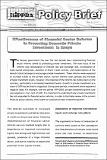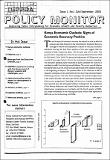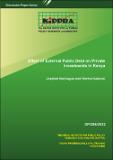| dc.description.abstract | A conducive business environment is crucial in attracting and sustaining private investments, thus allowing investors to devote their time to productive activities that grow their businesses. The importance of private investments is widely acknowledged in promoting efficient economic growth and development through employment and income creation. Despite the envisaged importance, private investments in Kenya still fall below the policy targets. Additionally, there is a gap in the literature on the extent to which the business environment constraints affect private firms’ capital investments in Kenya. Using the World Bank Enterprise Survey data of 2018 and employing the Cragg model, this study assesses the effects of selected business environment variables on the decision and intensity of private investments in Kenya. The results show that while the policy and regulatory framework to support private investments does exist, there is need to strengthen it to enhance efficiency and effectiveness. In addition, the study reveals important business environment variables including susceptibility to corrupt practises, access to finance, informal sector competition, and payment of taxes. Other determinants such as profitability, type of firm ownership, access to foreign markets, size of the firm, and productivity of establishments affect private investments in Kenya. Notable policy interventions comprise fast tracking the operationalization of an investment council to accelerate private investments in Kenya; strengthening the regulatory framework supporting private investments in Kenya; promoting access to credit; sealing revenue leakages; and removing bureaucratic red tapes in tax rates and administration. Further, strengthening institutions of governance to deal with the corruption malaise, promoting financial inclusion and streamlining business licencing and issuance of permits is also important. | en |




